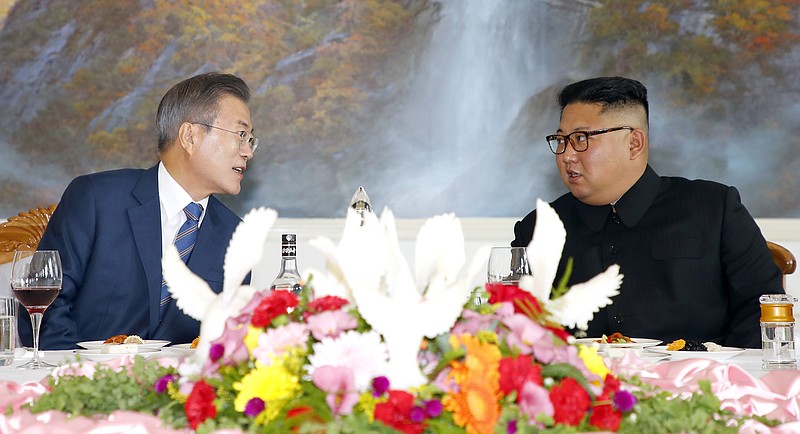A report Monday highlighting the location of 13 North Korea secret missile facilities shouldn't sink talks between the Asian country and the U.S. over North Korea's nuclear program, but it should confirm the soundness of the "trust but verify" strategy we and others have suggested for such negotiations.
"Trust but verify," ironically a Russian proverb, was a phrase frequently cited by former U.S. President Ronald Reagan about compliance in nuclear disarmament talks with the former Soviet Union in the 1980s.
In June, in a move four previous presidents were unable or unwilling to pull off, President Donald Trump met face to face with North Korea leader Kim Jong Un about the possibility of North Korea dismantling its nuclear program. Although strides were made toward a permanent peace between North and South Korea, the nuclear issue would be a work in progress.
Trump, in a rare understated moment, did not declare victory or announce "Mission Accomplished" or say that peace between the two countries was at hand. He indicated the visit only was the beginning of talks, that U.S. sanctions on the country would remain in place and that denuclearization, should it happen, would take time.
The recent report by the Center for Strategic and International Studies in Washington, D.C., said the 13 identified facilities - including one, Sakkanmol, just 50 miles north of the Demilitarized Zone and relatively close to Seoul, South Korea's capital - are among an estimated 20 North Korea continues to maintain even as it has halted missile test launches.
Sakkanmol is part of an array of bases that host missiles said to have the capability to hit South Korea, Japan and U.S. bases in the Pacific Ocean.
The existence of the facilities, contrary to early reports, has been widely known, but the new report provides more information on number and location.
"To call this a 'deception' is deeply misleading," Jeffrey Lewis, a North Korea arms analyst and author of a book on the regime's conflict, tweeted recently. "Kim Jong Un publicly stated that North Korea would shift to mass producing nuclear weapons in 2018. These bases and their missiles are well-known, long-standing and have never been offered for dismantlement by the DPRK."
Such bases apparently can be used for all classes of ballistic missiles, and, according to the new report, would be expected "to be subject to declaration, verification and dismantlement in any final and fully verifiable denuclearization deal."
The new information highlights the scope of the task before Trump and his team in creating and finalizing such a deal.
North Korea recently canceled an upcoming meeting with Secretary of State Mike Pompeo. However, Trump, to his credit, said the U.S. is in no rush and still holds hopes for another face-to-face meeting with Kim.
We think taking things slowly is the right approach and are grateful the president didn't act impetuously, canceling any future talks or resuming veiled threats against North Korea's leader.
Instead, he said last week, "There's no rush whatsoever."
U.S. leaders, after all, have been here before and have finalized agreements, only to find their counterpart didn't live up to them.
Indeed, drawn out, getting-to-know-you sessions might serve our country better. That's what North and South Korea have been doing for the better part of a year, with three summits, two communiques, a demilitarization agreement and a broader understanding between the two.
For now, on our part, we're not undoing sanctions, and South Korea is not testing weapons. A longer period of that is a sort of peace itself.
The Trump administration, of course, will have to determine its strategic goals, if it has not. Is complete denuclearization, down to the last bit of uranium, the goal, or is something less acceptable? Are there additional sanctions that can be added if necessary? Will China ever be willing to play a bigger role in convincing its neighbor to denuclearize? What would the U.S. be willing to provide if the country did reduce its nuclear weapons?
The long game here will be important. It will determine how important an improved relationship with the West is to Kim and how patient an impatient U.S. president can be in an effort to secure a peace that many of his predecessors have attempted but failed to reach.
It will determine if our future relationship with the young but ruthless North Korea leader will be, to use Trump's words, with "Rocket Man" or with the leader with whom he "fell in love" after they exchanged letters.
